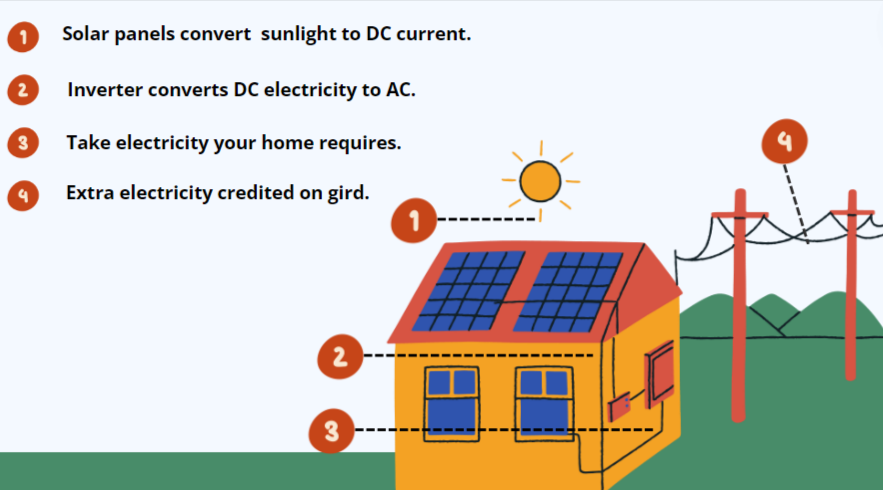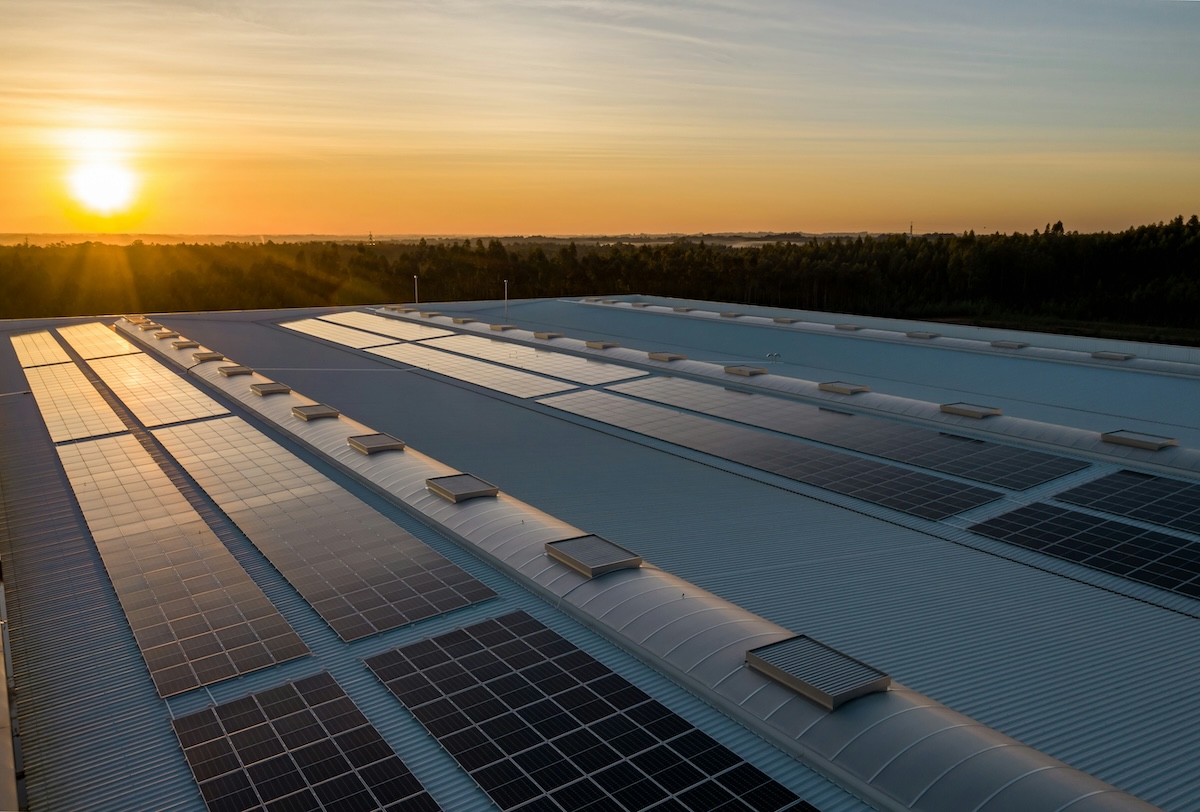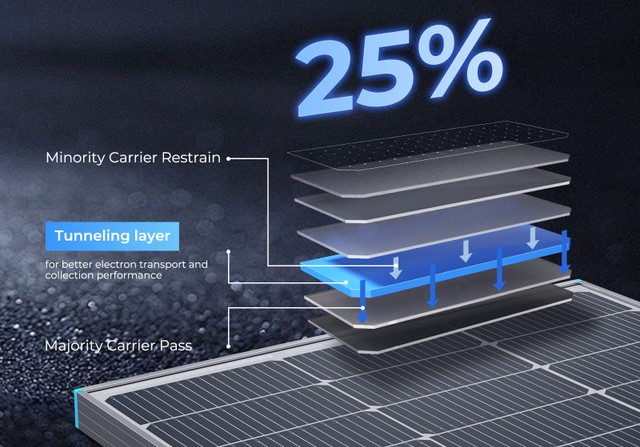Solar Energy 101: Complete Guide for Beginners
Solar energy is the light or heat that falls on the Earth's surface throughout the day. It is a clean, eco-friendly, and sustainable alternative to fossil fuel-based energy sources. With the help of solar panels, it is possible to convert the sun's energy into electrical current. You can use the obtained electricity to charge small to heavy-duty home appliances, such as refrigerators, air conditioners, TVs, lights, and more.
Nearly 4 million American households are generating power using solar systems to lower their electricity bills and reduce carbon emissions. However, when it comes to investing in suitable solar power systems, many people often start weighing the pros and cons of solar energy. If you're one of them and want to get a better understanding of the benefits of solar energy, this guide will explain everything in detail.
What is Solar Energy
Solar energy is the heat or light that is generated by the sun and is used to charge electrical appliances with the right equipment. Unlike coal, gas, or propane that gets depleted after each use, the renewable energy source like solar continues to replenish itself. While most of the current US electricity comes from fossil fuels like natural gas and coal, solar is becoming a large part of the country's energy profile.
Compared to gas or fuel-based generators, many homeowners prefer investing in solar panel systems. The PV (photovoltaic) cells are made with semiconductors that absorb the sun's energy and produce DC electricity. You can then convert the obtained DC to AC electricity with the help of an inverter and store the electricity in the solar battery for later use.
How Does Solar Energy Work

Solar energy works by converting the sun's energy into power. According to Energy.gov, the electricity striking the Earth's surface in one and a half hours can fulfill the energy demands of the entire world for one whole year. The solar power system, including solar panels, charge controllers, inverters, and batteries, works in tandem to generate electricity and charge household or outdoor appliances. Let's explain the working process of each component briefly:
PV Panels: The solar panels are made of monocrystalline or polycrystalline solar cells. They are kept under direct sunlight, where the solar cells convert the sun's energy into DC electricity.
Charge Controllers: The charge controllers regulate the current and voltage of the unregulated DC electricity to ensure safe movement from the solar panels to the batteries. Once the solar battery is fully charged, the charge controllers cut the incoming current and prevent overcharging.
Inverter: It's one of the most critical components of the solar power system, and it works to convert DC to AC electricity. The alternating current can then be used to charge household appliances, including microwaves, air conditioners, refrigerators, space heaters, and more.
Solar Battery: Solar batteries are yet another essential component of the solar power system. They are designed to store the excess power generated by the panels so that residents and business owners can use it later. They also help them charge electrical appliances at night or even during cloudy weather.
Whether you are a beginner or an expert solar enthusiast, Renogy solar kits provide reliable, efficient and user-friendly renewable energy solutions.
A Brief History of Solar Power
The invention of solar power dates back to the 7th century BC, when humans harnessed solar energy with the help of a magnifying glass. Later, in 1833, Charles Fritts produced electricity with rooftop solar panels. In 1954, Bell Labs designed the modern solar electric cell, which marked the beginning of the solar power era.
By the end of the 20th century, solar power systems began to appear on rooftops and even in large solar farms with high electricity demand. Many homeowners are also investing in solar generators or solar panels to produce their own electricity, lower their reliance on the utility grid, and save money on high electricity bills. Portable solar generators have also been invented to power appliances during off-grid adventures.
Solar Energy Advantages and Disadvantages
Many Americans are looking to lower their monthly electricity consumption and CO2 emissions in the atmosphere. Solar energy is one of the best ways to combat climate change by reducing emissions of greenhouse gases and carbon dioxide.
It's also a great power source for charging most household or outdoor appliances and lowering the pressure on the electricity grid. However, one important thing to note is that solar energy has some limitations that one must keep in mind while investing in a solar power system.
Advantages of Solar Energy
There's no doubt that solar energy is clean and renewable, which positively impacts the environment. However, it's also important to note that solar energy can benefit the homeowner by lowering the monthly bills and increasing the home value. If you're planning to invest in the solar power system but are unsure whether to go ahead or not, here are some of the benefits associated with it:
1. Reduce High Electricity Bills
The monthly electricity bills are over the roof, especially after the heat waves hit different parts of the US. The constant and prolonged use of heavy-duty appliances such as air conditioners can majorly impact electricity bills. That's where investing in a solar power system becomes quite essential. With the help of solar panels, you can produce your own electricity and charge household appliances such as air conditioners. This lowers the amount of electricity drawn from the utility grid and ultimately reduces the bills.
2. Environment-friendly Energy Source
Non-renewable energy resources such as coal, natural gas, and propane emit harmful carbon dioxide, sulfur oxides, and other greenhouse gases. In fact, nearly three-quarters of the total CO2 emissions are caused by the burning of fossil fuels for power and transportation purposes. Solar power systems do not emit any harmful fumes when converting sunlight into electricity or charging appliances. With the help of solar power systems, environmental emissions can be reduced to a significant extent.
3. Low Maintenance Costs
Solar panels generally come with a warranty period of 20 - 25 years and do not feature any moving parts. Therefore, they do not require any high maintenance. However, it's highly recommended that the surface of rooftop solar panels should be cleaned with a cloth to remove dust and debris. If you live in an area with a lot of dust and pollen, you can consider cleaning the solar panels every three months.

4. Renewable Energy
Unlike fossil fuels like natural gas, propane, or coal, solar power is a renewable energy source. You can use sunlight to generate electricity and keep on charging the electrical appliances without worrying about their depletion.
5. Increase Property Value
If you plan to resell your home in the future, solar panels can increase its overall value. According to the US Department of Energy's Lawrence Berkeley National Laboratory, home buyers are willing to pay an extra $15,000 for a home with rooftop solar panels.
6. Remote Power
There are many US people who love to spend time in their RV or camper, away from city life. If you're one of them, portable solar panels can help you generate electricity and power appliances anywhere. Instead of worrying about finding an electrical outlet in an off-grid or remote location, you can enjoy the RV trip with portable solar panels.
Disadvantages of Solar Energy
As you can see, there are many benefits of investing in a solar power system. However, just like any other thing, solar energy also comes with some limitations.
High Initial Investment
On average, the solar panels in the US cost anywhere between $10,000 and $30,000. While the solar panels will pay for themselves in a few years, the upfront amount can be expensive for many people.
Output Depends On Location
Since solar panels work only when there is sunlight, they won't produce electricity at night. If you want to go entirely off the grid, you'll need to invest in a battery along with the solar panels. In addition, the solar panels might be less effective when cloudy weather occurs. Hence, you may not get the desired amount of electricity if you live in an area that receives fewer sunlight hours.
Space Constraints
Not every household in the US has enough roof space to install multiple solar panels and generate electricity. If you do not have enough roof space for installation, you might need to look for some alternatives, such as portable solar panels.
How is Solar Energy Used Currently
Solar energy is used for various purposes, including cooling or heating homes whenever needed. If you've installed solar panels at your home, you don't have to worry about unexpected power outages or blackouts. The solar panels will continue generating electricity even if the power grid is down as long as sunlight is available. There are currently two ways to use solar energy and produce electricity, including photovoltaic panels and solar thermal systems.
PV Panels: Solar or PV panels are often made up of semiconductors that absorb the sun's rays hitting their surface. It excites the electrons in the panels and produces an electrical current that can charge appliances. The panels can also be connected to a solar battery to store the excess electricity and use later.
Solar Thermal Systems: Unlike solar panels, which are mainly used in households, solar thermal systems help generate electricity on larger scales. The system absorbs the sun's heat and warms the fluid in the receiver to generate electricity, heat water, or charge heavy-duty appliances like air conditioning units.
If you want to invest in a solar power system that works well during off-grid adventures and helps you reduce your monthly utility bills, you may consider Renogy solar panels. They are available in different types, including rigid, bifacial, flexible, and portable. For example, the Renogy 16BB N-Type 100 Watt Solar Panel is a portable charging solution for appliances during RV or camping trips. It has an efficiency rating of 25%, which provides 20W more power output than p-PERC panels of the same design.

Conclusion
With monthly utility bills increasing every passing year and greenhouse gases harming the environment, there's no better time to start investing in solar energy solutions. A reliable solar power system can help you charge appliances when there is a power outage in your area or you want to reduce your reliance on the utility grid.
Renogy is one of the leading solar brands that manufactures solar panels and kits. If you often plan outdoor adventures, you may consider flexible and portable solar panels. On the contrary, rigid solar panels and batteries would make more sense if you would like to invest in a durable rooftop charging solution for your home.
FAQs About Solar Power
1. How much energy does a solar panel produce?
On average, a solar panel system with an output rating of 250W - 400W may generate nearly 1.5kWh of electricity per day. However, the exact energy production might depend on several factors, including location, size and efficiency of the panels, and weather conditions.
2. Why is solar energy good?
Solar energy is a clean, sustainable, and eco-friendly alternative to non-renewable sources such as fossil fuels. It doesn't emit any harmful toxic gases that can lead to global warming and air pollution. They are also a reliable solution to reduce the dependency on the electricity grid and lower monthly bills.
3. How is solar energy converted into electricity
Solar panels made of monocrystalline or polycrystalline silicon solar cells are responsible for converting solar energy into electricity. The DC electricity generated by the solar power panels is then converted to AC electricity with the help of an inverter. Learn more details about solar energy conversion from this guide "how do solar panels work".











